Great Scott! The Fiend!
As has been pointed out by smart folks before, Luthor is a bellwether of what frightens people.
Luthor's first appearance cast him as a foreign despot, a caricature of the standard-issue Evil Foreigner. Considering that the Second World War was in the early stages, this seems like a predictable bogeyman.
However, "foreign badguy" was a motif didn't last beyond his first appearence. Throughout the forties and fifties, Luthor was the archetypal Mad Scientist.
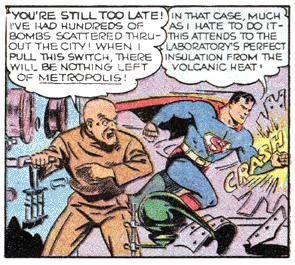
Luthor had the traditional Mad Scientist accoutrements: bald head, labs, death rays, intimidating name, the works. His artistic ancestors ran thick through the pulp magazines that predated comics, creating robots and bubbling potions.
But why? Why a "mad scientist?" And why was he a good opponent for Superman? How could a guy equipped only with Big Time Smarts be a match for a demigod?
I got me a theory.
The Luthor question begs the question "what is Superman?" Superman is a power fantasy, one of the purest examples to be found. He can do anything, unbound by physical restrictions. He can lift anything, move as fast as light, and is unrestricted even by the primal force of gravity. Plus he looks good in tights.
What is the nemesis of the power fantasy?
Whatever gives feelings of helplessness. The nemesis of a reader's power fantasy is whatever the reader feels has power over him.

In the first half of the twentieth century, science fit this bill. Technology expanded wildly in the twentieth century. Everyday life altered faster in that century than any period in history. And there wasn't much people could do to stop it. That's unnerving.
Then in 1945, science had produced the greatest terror imaginable: armageddon in a can.
Against this, what did the average person have? What if science created something horrible? Your world changed whether you liked it or not. Granted, most of this change was for the better, but the lack of control, the lack of power, was frightening.
Science had the world by the scruff of the neck, it seemed, and it unnerved a lot of folks.
Over time, as people grew accustomed to the benefits of science and a little less certain that atomic war was imminent, the idea of an Evil Scientist grew less powerful in the public mind. Science had its drawbacks, but it had its finer moments too. It became seen as more of a positive thing. Mad Scientists diminished in the public mind.
In 1960, Luthor changed again.
Perhaps reflective of the "Juvenile Delinquent" scares so common in popular culture of the fifties and the simultaneous growth of popular interest in psychology, Luthor gained a troubled childhood.
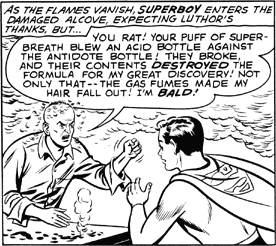
Rather than being Eeeevil for the sake of Eeeevil, Luthor became a man of great potential twisted by youthful trauma. (Granted, the trauma was ridiculous, but hey, we're dealing with children's stories. If every balding man swore revenge against the world for his hair loss, we'd be in a lot of trouble.)
In the revised Luthor story, Superboy accidentally harmed his friend Lex, and as a result was cursed with an implacable nemesis.
Psychology pushed into the public eye a new thing to fear, a new object to thwart our power fantasies: guilt. No matter how powerful Superman is, he could not undo the damage he had done in the past, even when it was a childhood accident. Physical power meant nothing against that.
The decades passed, comics rolled on, and Luthor continued to cackle, escape prison, hatch master plans, and get tossed right back into the pokey. He carried on as a mad scientist, to less and less effect. (His background as "the man driven insane by baldness" faded away, as readers found it just too dang silly.)
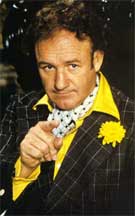 The Superman movie of 1978 introduced a new vision of Luthor. Gene Hackman portrayed Lex as part mad scientist, part used car salesman. He appeared to be a huckster with bad hair and cheap suit who talks a snappy line of patter. He seemed ridiculous and transparent, an obvious would-be low-level con man, easily dismissed and ignored. Underneath this facade was a megalomaniac with a plan to hijack nuclear weapons and make a vast fortune by the murder of tens of millions of people.
The Superman movie of 1978 introduced a new vision of Luthor. Gene Hackman portrayed Lex as part mad scientist, part used car salesman. He appeared to be a huckster with bad hair and cheap suit who talks a snappy line of patter. He seemed ridiculous and transparent, an obvious would-be low-level con man, easily dismissed and ignored. Underneath this facade was a megalomaniac with a plan to hijack nuclear weapons and make a vast fortune by the murder of tens of millions of people.The Hackman Luthor was a fine bogeyman for the post-Vietnam, post-Watergate era: the would-be charmer people thought they could write off as a buffoon, a devil with a warm smile and mass murder for profit in his heart.
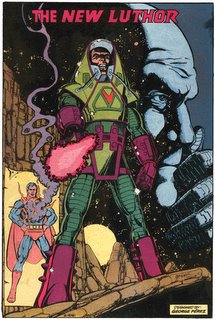 The comic book Luthor also evolved during this period. With the public's growing acceptance of science, his "evil scientist" aspect became less important, as did his "embittered childhood friend" angle. Luthor became more of a generic super-villain. Part of this transformation entailed Lex stealing an alien battlesuit that put him on a physical par with Superman. Luthor became just another strong guy who'd show up to punch out the strong hero. Yawn.
The comic book Luthor also evolved during this period. With the public's growing acceptance of science, his "evil scientist" aspect became less important, as did his "embittered childhood friend" angle. Luthor became more of a generic super-villain. Part of this transformation entailed Lex stealing an alien battlesuit that put him on a physical par with Superman. Luthor became just another strong guy who'd show up to punch out the strong hero. Yawn.This was not all that happened, however. In the late seventies and early eighties, Luthor acquired a new characteristic: an undercurrent of nobility.
For example, in the page below, Luthor gives up his chance to escape from Superman in order to save a drowning teenage boy. The Luthor of 1945 would not only have left the kid to die, he would have done so with a maniacal cackle. Not so the Luthor of 1980.
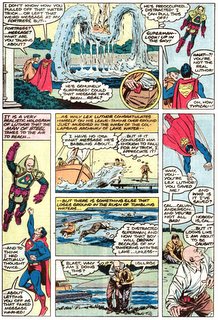 Science was no longer perceived by the public as The Enemy, the great implacable Outside Power that frightened us. It had done too much good. Therefore, the World's Greatest Scientist reformed, to a certain extent. He changed from Murderous Super-Villain to "Superman's Sparring Partner." He was a thief and, in theory, still dangerous, but his menace was gone.
Science was no longer perceived by the public as The Enemy, the great implacable Outside Power that frightened us. It had done too much good. Therefore, the World's Greatest Scientist reformed, to a certain extent. He changed from Murderous Super-Villain to "Superman's Sparring Partner." He was a thief and, in theory, still dangerous, but his menace was gone.
The entire Superman line was revamped in 1986, leading to a dramatic change in Lex Luthor. Knowing that science didn't scare people anymore, Marv Wolfman and John Byrne tapped into a new fear.
In 1986, who was felt to have great power over normal people? Scientists? Not really. Power lay with wealthy businessmen, and everybody knew it. Vast wealth means vast power, and concentrated power scares people. If a multibillionaire decides to mess with you, what could you do in response?
This angle also gave Superman new troubles, since Luthor was no longer a maniac in a green-and-purple jumpsuit piloting a rocket-powered Ape-Bot to destroy Metropolis. That Luthor was easy to stop. The new Lex Luthor was one of the most respected citizens of the United States, a captain of industry, and a ruthless bastard. He couldn't be touched by the law, since he was both cautious of his public image and so powerful that he owned the law.
This fear took an interesting turn a few years back. Luthor ran for President of the United States in 2000. And won.

President Lex Luthor. No foolin'. For four years of DC Comics, Lex Luthor was as the President.
Again, Lex Luthor became an example of what we fear most, of what we see as having power over us today: a zillionaire politician. Popular culture of the nineties was rife with distrust of the government. The comics processed this fear to produce a new nightmare: President Luthor.
Possibly because the zeitgeist has changed, possibly out of boredom, or most likely out of the constraints that "President Lex" puts on possible stories, Luthor recently flipped out, donned green battle armor, and started causing trouble in his mid-eighties fashion. He's no longer the President--he's just another would-be world conquering schmuck in powered armor.
Which strikes me as a mistake. Luthor should be the man who has power over us, not just another supervillain. That's my theory, leastways.
I'm not sure what Luthor should be now. What has power over everyday people that we all resent and/or fear?
Is the retro-armored Luthor supposed to reflect our fear of terrorism? A stateless madman with a thirst for bloody revenge? I'm not sure. Perhaps the change was motivated simply by bad thinking, and Luthor is in another fallow period, waiting for the chance to escape the "interchangable super-villain" mold and be recast as the newest form of Feared and Unchecked Power.
What should he be now?
A terrorist? A lawyer? A spammer, perhaps? Any suggestions?
I leave you here with one of my favorite Luthor moments. It's simple, direct, and wicked sweet: Luthor blasts a heat ray into the ocean and creates a super-hot tidal wave to destroy Metropolis.
That's freakin' awesome. Nobody uses heat rays anymore, dang it.
-----------------------
Note: Most pictures on this entry came from the excellent site Superman-Comics.com, which bestrides the narrow comic book internet like a colossus. Thanks for the brilliant site, guys.

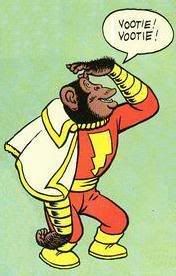
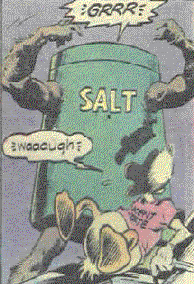
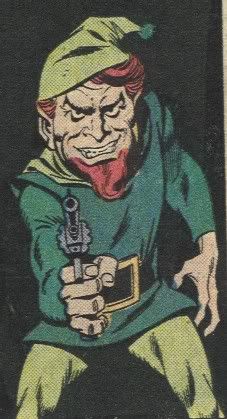

6 Comments:
Considering the age of most Lex Luthor fans, he should be a snotty, uppity teenager that doesn't listen to his parents and listens to hip hop. That or a terrorist. Everyone hates terrorists.
By Spencer Carnage, at 6:20 PM
Spencer Carnage, at 6:20 PM
>>(Granted, the trauma was ridiculous, but hey, we're dealing with children's stories. If every balding man swore revenge against the world for his hair loss, we'd be in a lot of trouble.)<<
Read that panel again: What Luthor's pissed about is Superboy wrecking (deliberately, in Luthor's mind) his greatest experiment: Creating life from inorganic chemicals. The blow to his vanity was just icing on the cake.
By Anonymous, at 7:43 PM
Anonymous, at 7:43 PM
But then I wouldn't have the joke about bald men seeking revenge...
The baldness was the symbol of the accident. It was the never-ending reminder as well as a blow to Lex's vanity. So it's key to the event.
Also, I left out the fact that young Lex was an arrogant, pissy, high-strung little jerk, and that some sort of meltdown seemed near-inevitable. If it hadn't been the fire and hair loss, it would have been something else later on.
A snotty hip-hop teenage Lex? Oooh, that has possibilities.
By Harvey Jerkwater, at 9:41 PM
Harvey Jerkwater, at 9:41 PM
A snotty uppity teenager? No way. Lex should be someone who profits from stealing identities and turning him into a sort of actual shapeshifter. Most people are afraid of getting their social security number stolen, their bank accountant taken, or credit card yanked, not to mention the huge fear or concern that the people you talk to online could be anything, a man if they say they're a girl or whatnot. He could be a master of the digital information age, but that kind of super villainy is way out of character for Lex. He's always been the showboating, bragging and vain type.
By Anonymous, at 9:26 PM
Anonymous, at 9:26 PM
The new Lex Luthor? Rather than aping Donald Trump, who has become a reality show host, he should now pattern himself after Steve Jobs or Bill Gates - only even more evil!
That way, he is responsible for the tech that pretty much dominates our lives - giving him power and stroke that can't be imagined.
Although, now that I think about it, reality show host may be a good occupation as well. Lex Luthor in The Apprentice!
P.S. I'd really like to see Lex build an Ape-Bot!
By Marc Burkhardt, at 8:25 PM
Marc Burkhardt, at 8:25 PM
Filing Cabinet of the Damned sounds like a creative or metaphorical concept, possibly referencing the storage of dark secrets, hidden truths, or forgotten histories. It evokes the idea of a collection of stories, memories, or items that are considered taboo, unsettling, or burdensome.
nuru massage parlour near me
By joispa, at 3:16 AM
joispa, at 3:16 AM
Post a Comment
<< Home